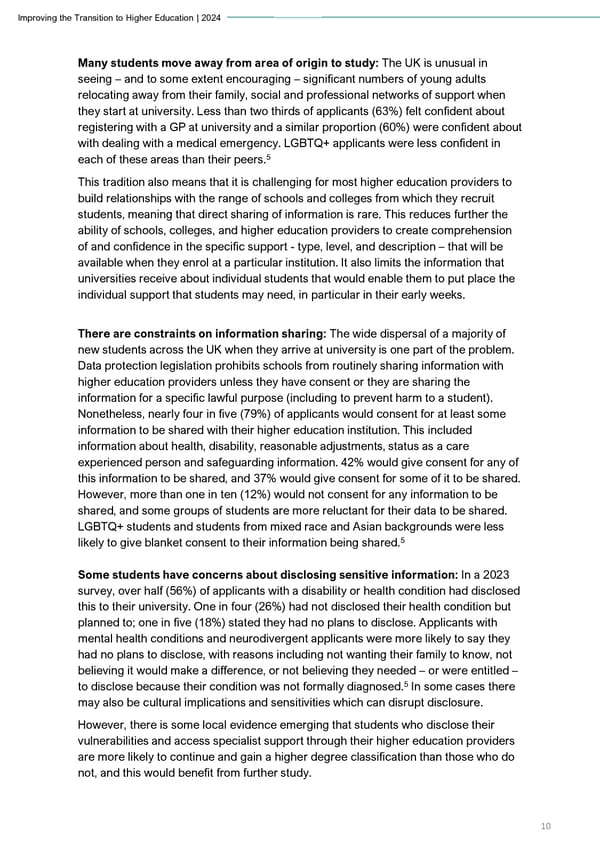Improving the Transition to Higher Education | 2024 Internal Many students move away from area of origin to study: The UK is unusual in seeing – and to some extent encouraging – significant numbers of young adults relocating away from their family, social and professional networks of support when they start at university. Less than two thirds of applicants (63%) felt confident about registering with a GP at university and a similar proportion (60%) were confident about with dealing with a medical emergency. LGBTQ+ applicants were less confident in each of these areas than their peers.5 This tradition also means that it is challenging for most higher education providers to build relationships with the range of schools and colleges from which they recruit students, meaning that direct sharing of information is rare. This reduces further the ability of schools, colleges, and higher education providers to create comprehension of and confidence in the specific support - type, level, and description – that will be available when they enrol at a particular institution. It also limits the information that universities receive about individual students that would enable them to put place the individual support that students may need, in particular in their early weeks. There are constraints on information sharing: The wide dispersal of a majority of new students across the UK when they arrive at university is one part of the problem. Data protection legislation prohibits schools from routinely sharing information with higher education providers unless they have consent or they are sharing the information for a specific lawful purpose (including to prevent harm to a student). Nonetheless, nearly four in five (79%) of applicants would consent for at least some information to be shared with their higher education institution. This included information about health, disability, reasonable adjustments, status as a care experienced person and safeguarding information. 42% would give consent for any of this information to be shared, and 37% would give consent for some of it to be shared. However, more than one in ten (12%) would not consent for any information to be shared, and some groups of students are more reluctant for their data to be shared. LGBTQ+ students and students from mixed race and Asian backgrounds were less likely to give blanket consent to their information being shared.5 Some students have concerns about disclosing sensitive information: In a 2023 survey, over half (56%) of applicants with a disability or health condition had disclosed this to their university. One in four (26%) had not disclosed their health condition but planned to; one in five (18%) stated they had no plans to disclose. Applicants with mental health conditions and neurodivergent applicants were more likely to say they had no plans to disclose, with reasons including not wanting their family to know, not believing it would make a difference, or not believing they needed – or were entitled – 5 to disclose because their condition was not formally diagnosed. In some cases there may also be cultural implications and sensitivities which can disrupt disclosure. However, there is some local evidence emerging that students who disclose their vulnerabilities and access specialist support through their higher education providers are more likely to continue and gain a higher degree classification than those who do not, and this would benefit from further study. 10
 Improving the transition to Higher Education Page 9 Page 11
Improving the transition to Higher Education Page 9 Page 11